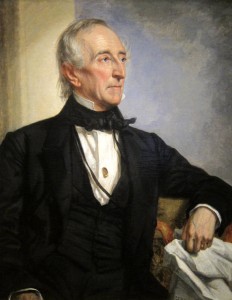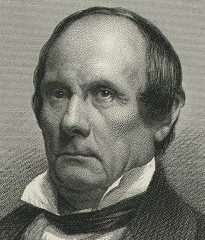On February 4, 1861 Virginia was sponsoring a peace convention in Washington, D.C.
From The New York Times Archive:
WASHINGTON, Sunday, Feb. 3.
… The Virginia Commissioners are holding a Caucus at the Tyler Rooms to-night, and, rumor says, will offer the first thing to-morrow, a resolution ignoring the use of force towards the seceding States. If this be voted down, the Southern Commissioners will retire. Mr. GUTHRIE says Kentucky demands a full and final settlement, now and forever. The impression seems to be that Virginia will control matters so far as the South is concerned. It is said the Southern Commissioners will demand the withdrawal of the troops from Washington before any negotiations are had, but this wants confirmation. …
The President has again countermanded the orders of Gen. SCOTT for additional troops for this city.

John Tyler's Virginia is belle of the ball - in both D.C. and Montgomery (Portrait by George P.A. Healy)
Is this a comedy routine? On January 29th The New-York Times reported that President Buchanan had changed his mind twice about whether or not to reinforce Washington, D.C. In today’s report the president once again countermanded General Scott’s orders. Notice: only 28 waffling days left before Inauguration.
It seems that Buchanan’s solicitude of Virginia is understandable given the Old Dominion’s geographic, demographic, and economic importance. My understanding is that the meeting of the seceding states in Montgomery, Alabama (also scheduled to begin on February 4th) tried to put a moderate spin on its proceedings in the hope of enticing states like Virginia and Kentucky. If Rhett and Yancey* are willing to tone it down for Virginia, Buchanan’s indecision makes more sense.
The New York Times Archive published a letter from Tyler to Virginia’s governor John Letcher going over his interactions with Buchanan during Tyler’s January visit to Washington.
James Guthrie was
Secretary of the Treasury during the Pierce administration.
* 2-4-2011 update: I found out that Alabama’s William L. Yancey was not a delegate to the Montgomery convention, although “he delivered the address of welcome to Jefferson Davis, selected as provisional President, on his arrival at Montgomery. While many of the fire-eaters were opposed to the selection of a relative moderate like Davis, Yancey accepted him as a good choice”.

